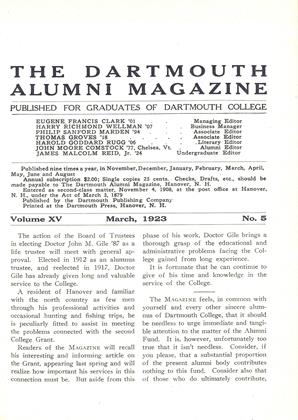The analysis of the undergraduate expenditure of time recently conducted by The Dartmouth has created considerable interest since its publication and the ALUMNI MAGAZINE reprints here two editorials commenting upon the statistics.
A DAY IN DARTMOUTH
From the New York Herald.
On the basis of schedules prepared by 200 students Dartmouth College has worked out an estimate of the division of time made by the average undergraduate at Dartmouth.
The results show that he works nine hours a day and sleeps eight and a quarter hours. His itemized account of the time spent in recreation shows a total of five and one half hours daily. That leaves one hour and a quarter unaccounted for, which probably can be added to the total given under recreation.
Not all of the nine hours allotted to work are spent in classes and in study. A somewhat intangible item described as "fraternity effort" is included, besides time devoted to work done for self-support and to compulsory athletics.
The figures given for work and sleep may fairly be taken as typical of the time consumed by the average student in other colleges. In the division of his recreational hours, however, the Dartmouth student probably varies considerably from the student who attends an institution located in or near a big city.
He calculates that every day he spends one hour and a half in conversation, three quarters of an hour each in physical recreation and reading not demanded by his courses, an hour and a half at the motion pictures, half an hour in attendance at games and twenty minutes in card playing. Girls claim only five minutes of his day and music an equal number.
Apparently, if prohibition is strictly enforced in the neighborhood of Hanover, wine, woman and song have about as much part in the daily life of the Dartmouth student as they had in the course of any twenty-four hours for a resident of Plymouth, Massachusetts, in the seventeenth century.
Dartmouth of course prides itself on being an outdoor college. Its sons are deep-chested. In the winter months they go to sleep with their snowshoes on. Perhaps these figures reflect faithfully Dartmouth's contempt for the enervating influences of civilization, but surely they would never do for Amherst, across the way from Smith, or for Harvard, with Boston and Wellesley at hand.
The allotment of one and a half hours daily to the motion pictures raises the question whether this indulgence is the result of Dartmouth's isolation, or whether it has become typical of the college student. Ten hours and a half a week is a lot of time to spend looking at pictures.
On the whole it is not a badly balanced day for the average boy. Certainly it is not the sort of schedule that will bring him anywhere near the edge of a breakdown.
A COLLEGE TIME ANALYSIS AND THE RISING GENERATION
(From the Newark, (N. J.) News)
Dartmouth's college paper—a self-supporting daily of parts—has analyzed with meticulous care how Dartmouth students spend their time. The results should be gratifying to Dartmouth parents of whom New Jersey domiciles a goodly share.
A syllabus of these results might be stated in the simple sentence that Dartmouth students, all years included, average about nine hours of "work" every week day, and waste- if that be the word—but three and a half minutes per day on "girls," excepting Sundays, when the fair sex is accorded nine minutes per man.
Based upon the recorded time use of some 200 students of all classes, the college week day, five days of the week, appears from this analysis to be made up of nine hours of "work"—this including all required activities, as distinguished from periods when "the student's time. is his own."
Four hours of study, three hours of attendance on classes, seventeen minutes for athletics, twenty-five for dramatics, debating and similar activities, ten for fraternity duties, and forty-five for self-support, enter into this total, among other items. Four hours and ten minutes a day go to recreation, which claims eight hours on Saturday and five on Sunday— including that,, extra six minutes for the girls. And recreation includes an hour and a half a day, average, for "conversation and discussion"—with others than girls.
There is much more in the analysis, all of it interesting. The point is its bearing upon the moot question of the evaluation to be placed by oldsters upon the rising generation.
Dartmouth may not be representative of our college youth, but there is no particular reason why it should not be. So long as the average "stude" works longer hours than any self-respecting day laborer could be persuaded to work, "chews the rag" but an hour and a half a day, and devotes but three minutes week days and nine minutes Sundays to the girls (plus what part of his half-hour a day spent writing letters may be ascribed to interest in an absent girl), the much advertised lackadaisicalness of the young man of the day would seem to have small look-in.
 View Full Issue
View Full Issue
More From This Issue
-
 Article
ArticleTHE DARTMOUTH ANVIL
March 1923 By SAMUEL W. McCALL '74 -
 Article
ArticleThe action of the Board of Trustees in electing Doctor John M. Gile '87
March 1923 -
 Article
ArticleTHE ORIGINS OF DELTA ALPHA—A SYMPOSIUM
March 1923 -
 Books
BooksFACULTY PUBLICATIONS
March 1923 By WILBUR M. URBAN -
 Class Notes
Class NotesCLASS OF 1911
March 1923 By Prof. Nathaniel G. Burleigh -
 Article
ArticleFRATERNITIES PLEDGE 57 PER CENT OF FRESHMEN
March 1923
Article
-
 Article
ArticleFurnace Gas Kills Nine at Theta Chi House
March 1934 -
 Article
ArticleThe Alumni Fund Reaches New Heights
August 1944 -
 Article
ArticleSUMMER STUDY IN RUSSIA
JUNE 1965 -
 Article
ArticleCollege Adopts Policy To Protect Moosilauke
NOVEMBER 1972 -
 Article
ArticleTrack
April 1956 By CLIFF JORDAN '45 -
 Article
ArticleEquinox: A Poem of the Hanover Fall Season
November 1932 By Pennington Haile


